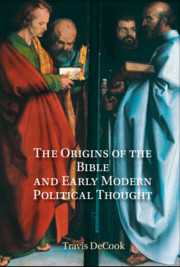 The Origins of the Bible and Early Modern Political Thought
The Origins of the Bible and Early Modern Political Thought Scriptural Revelation, Secularity, and Social Organization in Francis Bacon’s New Atlantis
Published online by Cambridge University Press: 02 March 2021
This chapter examines the portrayal of Scripture as miraculously transcendent of history, human activity, and material conditions in Francis Bacon’s utopian narrative New Atlantis. It considers how this imagined Bible founds a mode of social organization oriented towards human mastery over created nature. Drawing on Maurice Blondel’s concept of “extrinsicism,” which describes a stark separation of revelation from its human and historical mediations, this chapter analyzes the significance of this transcendent Bible, including the displacement of human agency, history, and culture from its production and transmission. This chapter argues that the social organization oriented to the acquisition and implementation of natural knowledge imagined by Bacon is enabled by the seemingly secularizing boundaries between revelation and reason, and theology and philosophy, which this miraculous Bible establishes. However, the apparently secularizing consequences of a wholly transcendent Bible are disrupted when considered in the larger frame of Baconian philosophy, which in fundamental ways retains a theological conception of nature and of the social organization needed to harness its power.
To save this book to your Kindle, first ensure no-reply@cambridge.org is added to your Approved Personal Document E-mail List under your Personal Document Settings on the Manage Your Content and Devices page of your Amazon account. Then enter the ‘name’ part of your Kindle email address below. Find out more about saving to your Kindle.
Note you can select to save to either the @free.kindle.com or @kindle.com variations. ‘@free.kindle.com’ emails are free but can only be saved to your device when it is connected to wi-fi. ‘@kindle.com’ emails can be delivered even when you are not connected to wi-fi, but note that service fees apply.
Find out more about the Kindle Personal Document Service.
To save content items to your account, please confirm that you agree to abide by our usage policies. If this is the first time you use this feature, you will be asked to authorise Cambridge Core to connect with your account. Find out more about saving content to Dropbox.
To save content items to your account, please confirm that you agree to abide by our usage policies. If this is the first time you use this feature, you will be asked to authorise Cambridge Core to connect with your account. Find out more about saving content to Google Drive.